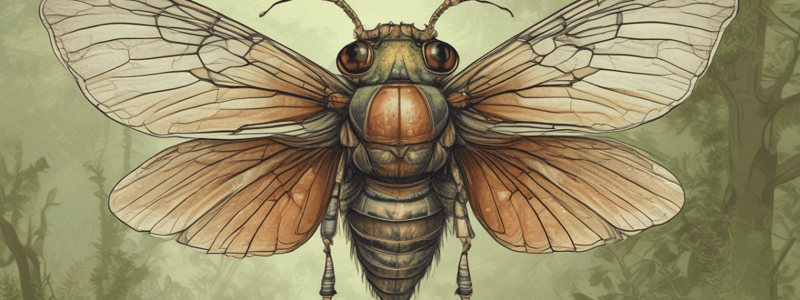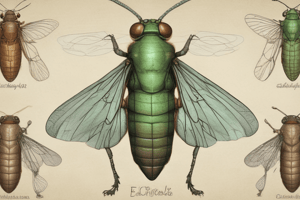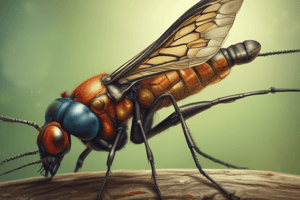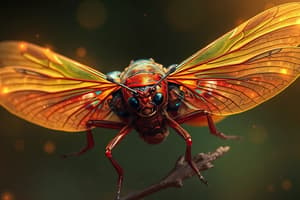Podcast
Questions and Answers
What is the primary source of food for cicadas?
What is the primary source of food for cicadas?
- Xylem liquids (correct)
- Insect matter
- Grasses and seeds
- Leaves and soft plant tissues
What is the common misconception about cicadas?
What is the common misconception about cicadas?
- They are a type of beetle
- They are a type of locust (correct)
- They are a type of cricket
- They are a type of grasshopper
Where are the species of cicadas that spend 17 years underground primarily found?
Where are the species of cicadas that spend 17 years underground primarily found?
- Northeastern United States (correct)
- Northwestern United States
- Southeastern United States
- Southwestern United States
What is the name of the fungus that infects cicadas?
What is the name of the fungus that infects cicadas?
What percentage of cicadas are infected by the fungus Massospora cicadina?
What percentage of cicadas are infected by the fungus Massospora cicadina?
What is the unusual behavior displayed by infected male cicadas?
What is the unusual behavior displayed by infected male cicadas?
What is the purpose of the cicadas' underground life?
What is the purpose of the cicadas' underground life?
What is the name of the group of cicadas that last emerged in 2002?
What is the name of the group of cicadas that last emerged in 2002?
What is the genus of the periodical cicadas mentioned in the text?
What is the genus of the periodical cicadas mentioned in the text?
How often do the periodical cicadas in the area emerge?
How often do the periodical cicadas in the area emerge?
What is the main difference in diet between cicadas and locusts?
What is the main difference in diet between cicadas and locusts?
What is the result of Massospora cicadina infection on cicadas?
What is the result of Massospora cicadina infection on cicadas?
Why do infected cicadas display altered behavior?
Why do infected cicadas display altered behavior?
What is the geographic distribution of the cicadas that spend 13 years underground?
What is the geographic distribution of the cicadas that spend 13 years underground?
What is the name of the cicada group that the narrator is searching for?
What is the name of the cicada group that the narrator is searching for?
How long do periodical cicadas typically spend underground?
How long do periodical cicadas typically spend underground?
What is the primary role of xylem liquids in cicadas' diet?
What is the primary role of xylem liquids in cicadas' diet?
Why are cicadas not closely related to locusts?
Why are cicadas not closely related to locusts?
What is the result of the cicadas' underground life?
What is the result of the cicadas' underground life?
What is the purpose of the narrator's search for the fungus?
What is the purpose of the narrator's search for the fungus?
Flashcards are hidden until you start studying
Study Notes
- The narrator is in an area where periodical cicadas are abundant, and they find the sound of their buzzing fascinating.
- Cicadas are not true crickets, and although some people mistakenly refer to them as locusts, they are not closely related to locusts, which are actually more closely related to grasshoppers.
- Cicadas feed primarily on xylem liquids, which contain water, amino acids, and minerals, whereas locusts feed on leaves and soft plant tissues.
- The periodical cicadas in the area belong to the genus Magicicada and are found throughout the eastern and central United States.
- These cicadas spend most of their lives underground and emerge every 13 or 17 years, depending on the region and species.
- The species that spend 17 years underground have a more northerly distribution in the United States, while those that emerge every 13 years have a more southerly distribution.
- The cicadas in the area at the time of filming belong to Brood Number Eight, which last emerged in 2002.
- The narrator is searching for a fungus that infects these cicadas, causing their abdomens to fall off and altering their behavior.
- The fungus is a pathogenic fungus known as Massospora cicadina, which infects around 2-5% of cicadas.
- Infected cicadas display strange behavior, such as males acting like sexually receptive females, and can spread the fungal spores far and wide.
- The fungal spores can remain dormant for over a dozen years, awaiting the emergence of the next brood of periodical cicadas.
- The fungus contains the alkaloid compound cathinone, a naturally occurring amphetamine found in certain plants, which may cause infected cicadas to be more active in spreading fungal spores.
- Researchers have also found that other species of Massospora that infect annual cicadas contain the mind-altering compounds psilocybin and ibotenic acid, which are responsible for the hallucinogenic effects produced by certain mushrooms.
- Despite the majority of periodical cicadas showing no signs of fungal infection, the narrator finds the hunt to locate infected cicadas thrilling and rewarding.
Studying That Suits You
Use AI to generate personalized quizzes and flashcards to suit your learning preferences.





